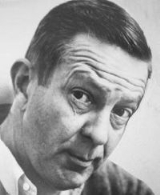
of the suburbs." His fiction is mostly set in the Upper East Side
of Manhattan
, the Westchester
suburbs, old New England
villages based on various South Shore towns around Quincy, Massachusetts
, where he was born, and Italy
, especially Rome
. He is "now recognized as one of the most important short fiction writers of the 20th century." While Cheever is perhaps best remembered for his short stories (including "The Enormous Radio
," "Goodbye, My Brother," "The Five-Forty-Eight
," "The Country Husband," and "The Swimmer
"), he also wrote a number of novels, such as The Wapshot Chronicle
(National Book Award
, 1958), The Wapshot Scandal (William Dean Howells Medal, 1965), Bullet Park (1969), and Falconer
(1977).
His main themes include the duality of human nature: sometimes dramatized as the disparity between a character's decorous social persona and inner corruption, and sometimes as a conflict between two characters (often brothers) who embody the salient aspects of both – light and dark, flesh and spirit.
The novel remains for me one of the few forms where we can record man’s complexity and the strength and decency of his longings. Where we can describe, step by step, minute by minute, our not altogether unpleasant struggle to put ourselves into a viable and devout relationship to our beloved and mistaken world.![]()
He was a tall man with an astonishing and somehow elegant curvature of the spine, formed by an enlarged lower abdomen, which he carried in a stately and contented way, as if it contained money and securities.![]()
Homesickness is nothing … Fifty percent of the people in the world are homesick all the time.![]()
Art is the triumph over chaos.![]()
I can’t write without a reader. It’s precisely like a kiss—you can’t do it alone.![]()
The need to write comes from the need to make sense of one’s life and discover one’s usefulness.![]()
A collection of short stories is generally thought to be a horrendous clinker; an enforced courtesy for the elderly writer who wants to display the trophies of his youth, along with his trout flies.![]()
For me, a page of good prose is where one hears the rain [and] the noise of battle. [It] has the power to give grief or universality that lends it a youthful beauty.![]()
I sometimes go back to walk through the ghostly remains of Sutton Place where the rude, new buildings stand squarely in one another’s river views.![]()
When I remember my family, I always remember their backs. They were always indignantly leaving places. That’s the way I remember them, heading for an exit.![]()

